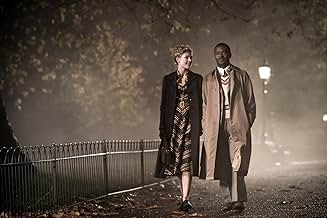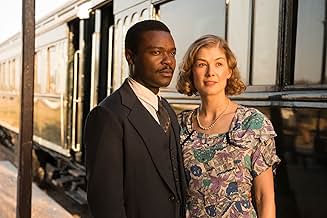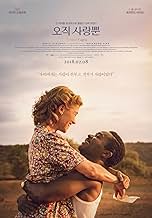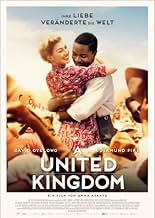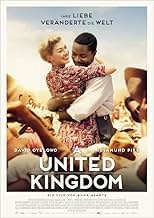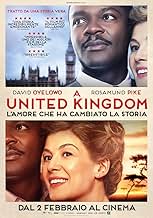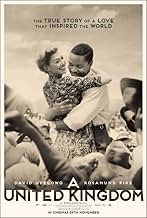A United Kingdom
- 2016
- Tous publics
- 1h 51min
NOTE IMDb
6,9/10
17 k
MA NOTE
L'histoire du roi Seretse Khama du Botswana et comment son mariage passionné, mais controversé avec une femme blanche britannique, Ruth Williams, a plongé son royaume dans des troubles polit... Tout lireL'histoire du roi Seretse Khama du Botswana et comment son mariage passionné, mais controversé avec une femme blanche britannique, Ruth Williams, a plongé son royaume dans des troubles politiques et diplomatiques.L'histoire du roi Seretse Khama du Botswana et comment son mariage passionné, mais controversé avec une femme blanche britannique, Ruth Williams, a plongé son royaume dans des troubles politiques et diplomatiques.
- Réalisation
- Scénario
- Casting principal
- Récompenses
- 6 victoires et 5 nominations au total
Avis à la une
This is an outstanding film about a story I knew nothing about. However, my review is more a review of IMDb and its voting system.
I note that this film has, at the time of writing twenty-two 1 star reviews. Maybe these are genuine but I suspect they are not. For one thing the film has not had many screenings so have as many as twenty-two different people really hated it that much?
Secondly, 1 star films do not get selected for the Toronto Film Festival or for the opening night film for the London Film Festival. The programmers and selectors of these highly regarded festivals are at the top of their game and each year they are offered several thousand films. None of them are going to risk their hard fought reputations on selecting a bad 1-star film.
My feeling is that these 22 people are members of the KKK who hate black people or else they are people who are jealous of the those involved in the production.
Either way IMDb needs to have an algorithm that can deduce whether these people are genuine, or not. Maybe they are and the press reviews so far, which rave about the film, are wrong, but maybe these people are racist bitter bigots who hate the success of others because they themselves are failures and they have nothing better to do in their small sad lives but set up false IMDb accounts and vent their spleen in the only way they can.
Time as they say will tell.
I note that this film has, at the time of writing twenty-two 1 star reviews. Maybe these are genuine but I suspect they are not. For one thing the film has not had many screenings so have as many as twenty-two different people really hated it that much?
Secondly, 1 star films do not get selected for the Toronto Film Festival or for the opening night film for the London Film Festival. The programmers and selectors of these highly regarded festivals are at the top of their game and each year they are offered several thousand films. None of them are going to risk their hard fought reputations on selecting a bad 1-star film.
My feeling is that these 22 people are members of the KKK who hate black people or else they are people who are jealous of the those involved in the production.
Either way IMDb needs to have an algorithm that can deduce whether these people are genuine, or not. Maybe they are and the press reviews so far, which rave about the film, are wrong, but maybe these people are racist bitter bigots who hate the success of others because they themselves are failures and they have nothing better to do in their small sad lives but set up false IMDb accounts and vent their spleen in the only way they can.
Time as they say will tell.
At first I thought this movie would ruin this story. It's a painful, yet hopeful and loving chapter of African history. This is NOT a love story. If people should come to watch this movie hoping for a "love conquers all" plot... They should be very disappointed. And I'm fairly glad for that. I congratulate the director, Amma Asante, for rendering this story into the big screen with delicacy and respect to all involved. I thank her for realizing all this story was NOT, and putting it out for the public from the first frame. I also love her for showing almost everything this story was about, without going into great detail.
This movie is based on the true relationship between the King of (now) Botswana, Sir Seretse Khama, and a white British woman, Ruth Williams. Today we might know Ruth and Khama as leaders in the fight for the country's independence (since it was, when they married, a British protectorate), but their struggle started way sooner. Their story became their country's story. A fight for their right to choose.
It's not about their love. It's about his choice, not to marry within his tribe's customs, and her choice, to up and leave her home, building herself a new life from scratch. It's about a country's choice to their leader - and how much the world hates him, her and the country for the nerve to demand their voices be heard with such fire.
Amma Asante thrives on sewing up Seretse and Ruth deep within the political setting, in a beautiful dance, until we cannot see the lines between them. She also shows how much resistance change can face - and overcome. Their marriage becomes a set of lens for the viewer to analyze strength and frailty confined in this tiny world full of hope. And it gets you going.
Rosamund Pike and Daniel Oyelowo are simply superb. His performance here is stronger than Selma's, which is saying something. And though Pike had less screen time than Oyelowo, her presence is felt throughout every scene. It doesn't fail. Pike gives a poignant performance of a true turnaround in life, and she gets us engaged with her every move. She doesn't have to show her face; every spin this movie gives gets the viewer thinking about Ruth's reaction, thanks to her powerful deliverance.
With that power couple, I thought the supporting cast would be weak and acceptable... I was surprised. Again. Tom Felton, Jack Davenport, Laura Carmichael (why, hello, Lady Edith!), Terry Pheto, Vusi Kunene, Jessica Oyelowo and Abena Ayivor, to name a (very) few, were splendid in their roles and really brought the tension between marriage and politics alive.
Cinematography is delightful, which goes really well with the dazzling music score. The somber tones of post-war London are contrast to the joyful sounds and colors of the southern borders of Africa; yet you hear pain in their laughter as well as you see smiles in British tears. Everything is designed to really bring the viewer there and then.
It's an interesting and delicate take in a true story, that happened not so long ago. It's a solid 7, because of historical inconsistencies throughout the film (the lasting of the protectorate, Indian's ruler at the time of independence, and so on), but it's definitely worth at least a screening.
This movie is based on the true relationship between the King of (now) Botswana, Sir Seretse Khama, and a white British woman, Ruth Williams. Today we might know Ruth and Khama as leaders in the fight for the country's independence (since it was, when they married, a British protectorate), but their struggle started way sooner. Their story became their country's story. A fight for their right to choose.
It's not about their love. It's about his choice, not to marry within his tribe's customs, and her choice, to up and leave her home, building herself a new life from scratch. It's about a country's choice to their leader - and how much the world hates him, her and the country for the nerve to demand their voices be heard with such fire.
Amma Asante thrives on sewing up Seretse and Ruth deep within the political setting, in a beautiful dance, until we cannot see the lines between them. She also shows how much resistance change can face - and overcome. Their marriage becomes a set of lens for the viewer to analyze strength and frailty confined in this tiny world full of hope. And it gets you going.
Rosamund Pike and Daniel Oyelowo are simply superb. His performance here is stronger than Selma's, which is saying something. And though Pike had less screen time than Oyelowo, her presence is felt throughout every scene. It doesn't fail. Pike gives a poignant performance of a true turnaround in life, and she gets us engaged with her every move. She doesn't have to show her face; every spin this movie gives gets the viewer thinking about Ruth's reaction, thanks to her powerful deliverance.
With that power couple, I thought the supporting cast would be weak and acceptable... I was surprised. Again. Tom Felton, Jack Davenport, Laura Carmichael (why, hello, Lady Edith!), Terry Pheto, Vusi Kunene, Jessica Oyelowo and Abena Ayivor, to name a (very) few, were splendid in their roles and really brought the tension between marriage and politics alive.
Cinematography is delightful, which goes really well with the dazzling music score. The somber tones of post-war London are contrast to the joyful sounds and colors of the southern borders of Africa; yet you hear pain in their laughter as well as you see smiles in British tears. Everything is designed to really bring the viewer there and then.
It's an interesting and delicate take in a true story, that happened not so long ago. It's a solid 7, because of historical inconsistencies throughout the film (the lasting of the protectorate, Indian's ruler at the time of independence, and so on), but it's definitely worth at least a screening.
This is one of those movies that is flying under the radar and deserves to be seen. It is a wonderful story, well scripted, well acted, and has terrific cinematography. The fact that is a true story makes one wonder what the hell we have been learning in school when we have never been taught this type of history. I give this a ten and really it deserves it. It is a shame people have degraded the rating for some reason other than the fact that this is good cinema. It is a very deserving movie and is like the movie Hidden Figures or Queen Katwe, it is important for history. I am a white conservative and think everyone should see the movie.
"A United Kingdom" is based on the true-life relationship between Sir Seretse Khama, an African chieftain from what was then the Bechuanaland Protectorate, and a white British woman, Ruth Williams. The film implies that he was the King of Bechuanaland, but in fact no single individual ever held this position; Khama was the ruler of the Bangwatho, one of a number of tribes making up the Tswana nation, the largest ethnic group in the country. In Botswana, as Bechuanaland is now known, Khama and Ruth are today revered figures, as he was the leader of the country's independence movement and its first President when independence was achieved in 1966; unlike most other former colonies in Africa Botswana has remained a democracy ever since, and their son is the current President.
Khama's marriage to Ruth Williams (they met while he was studying in London in 1948) was highly controversial at the time. Many of Khama's own people, led by his uncle, refused to accept Ruth as their Queen. The South African government, which was just starting to introduce its policy of apartheid, objected furiously to the idea of a high-profile black leader in a neighbouring country marrying a white woman. Clement Attlee's Labour government, anxious to placate the South Africans who were threatening to leave the Commonwealth, intervened, exiling Khama from Bechuanaland and forbidding him to return. Winston Churchill, at the time leader of the Opposition, initially made sympathetic noises, but after the Conservatives were returned to power in 1951 he took an even harder line than Attlee. The situation was complicated by the discovery of diamonds in the territory; the British government, using the rift between Khama and his uncle as a pretext, threatened to revoke Bechuanaland's status as a Protectorate and declare it a Crown Colony. (The real reason was that in a Protectorate mineral rights belonged to the local people, whereas in a colony they belonged to the colonial power). One of Khama's few British allies was the Labour MP Tony Benn.
The action switches between an austere, drab post-war Britain and a bright sunlit Africa. The recreation of historical detail is well done and both the leading actors, David Oyelowo as Khama and Rosamund Pike as Ruth, are excellent. The film is an interesting look at a historical romance which made the headlines at the time but which today is largely forgotten, at least in Britain. 7/10
Some goofs. We hear a radio broadcast on the eve of Indian independence in 1947 telling us that Indians would go to bed "subjects of the Queen". Britain still had a King, George VI, in 1947. We are told that Queen Victoria made Bechuanaland a Protectorate to protect its people from "racist South Africa", but the Protectorate was created in 1885, twenty-five years before South Africa came into existence as a single nation. (In 1885 it was still a patchwork of British colonies and Boer republics). Prime Minister Attlee claims that the Presidents of South Africa, South-West Africa and the two Rhodesias were all opposed to Khama's marriage to Ruth. During Attlee's term of office (1945-51) none of these territories had a President.
Khama's marriage to Ruth Williams (they met while he was studying in London in 1948) was highly controversial at the time. Many of Khama's own people, led by his uncle, refused to accept Ruth as their Queen. The South African government, which was just starting to introduce its policy of apartheid, objected furiously to the idea of a high-profile black leader in a neighbouring country marrying a white woman. Clement Attlee's Labour government, anxious to placate the South Africans who were threatening to leave the Commonwealth, intervened, exiling Khama from Bechuanaland and forbidding him to return. Winston Churchill, at the time leader of the Opposition, initially made sympathetic noises, but after the Conservatives were returned to power in 1951 he took an even harder line than Attlee. The situation was complicated by the discovery of diamonds in the territory; the British government, using the rift between Khama and his uncle as a pretext, threatened to revoke Bechuanaland's status as a Protectorate and declare it a Crown Colony. (The real reason was that in a Protectorate mineral rights belonged to the local people, whereas in a colony they belonged to the colonial power). One of Khama's few British allies was the Labour MP Tony Benn.
The action switches between an austere, drab post-war Britain and a bright sunlit Africa. The recreation of historical detail is well done and both the leading actors, David Oyelowo as Khama and Rosamund Pike as Ruth, are excellent. The film is an interesting look at a historical romance which made the headlines at the time but which today is largely forgotten, at least in Britain. 7/10
Some goofs. We hear a radio broadcast on the eve of Indian independence in 1947 telling us that Indians would go to bed "subjects of the Queen". Britain still had a King, George VI, in 1947. We are told that Queen Victoria made Bechuanaland a Protectorate to protect its people from "racist South Africa", but the Protectorate was created in 1885, twenty-five years before South Africa came into existence as a single nation. (In 1885 it was still a patchwork of British colonies and Boer republics). Prime Minister Attlee claims that the Presidents of South Africa, South-West Africa and the two Rhodesias were all opposed to Khama's marriage to Ruth. During Attlee's term of office (1945-51) none of these territories had a President.
A United Kingdom is a true and gripping tale which handles it true historical source material with aplomb. With fantastic performances from Oyelowo and especially Pike, the central characters plight is beautifully illustrated. It's not perfect; some of the writing is a little clunky, but the character chemistry is there, and you leave the movie theatre feeling like a part of the story.
Quite how this movie receives the rating it does is completely beyond me. I can only imagine that half the voters didn't in fact see the movie.
Quite how this movie receives the rating it does is completely beyond me. I can only imagine that half the voters didn't in fact see the movie.
Le saviez-vous
- AnecdotesThe house used as Ruth & Seretse's home in the film was the home of the real Ruth & Seretse.
- GaffesAt about 1'17, the civil servant refers to the new Prime Minister as Sir Winston Churchill. He was not knighted until 1953.
- Citations
Seretse Khama: No man is free who is not master of himself.
- ConnexionsFeatured in Film '72: Épisode #45.8 (2016)
- Bandes originalesNo Baby, No Nobody But You
Lyrics and Music by Seger Ellis
Performed by Stan Kenton and June Christy
Published by EMI United Partnership Ltd/EMI Music Publishing Ltd
Licensed Courtesy of Capitol Records Inc.
Under Licence from Universal Music Operations Ltd
Meilleurs choix
Connectez-vous pour évaluer et suivre la liste de favoris afin de recevoir des recommandations personnalisées
- How long is A United Kingdom?Alimenté par Alexa
Détails
- Date de sortie
- Pays d’origine
- Site officiel
- Langues
- Aussi connu sous le nom de
- Об'єднане королівство
- Lieux de tournage
- Sociétés de production
- Voir plus de crédits d'entreprise sur IMDbPro
Box-office
- Budget
- 14 000 000 $US (estimé)
- Montant brut aux États-Unis et au Canada
- 3 902 185 $US
- Week-end de sortie aux États-Unis et au Canada
- 66 510 $US
- 12 févr. 2017
- Montant brut mondial
- 14 459 330 $US
- Durée
- 1h 51min(111 min)
- Couleur
- Rapport de forme
- 2.35 : 1
Contribuer à cette page
Suggérer une modification ou ajouter du contenu manquant







